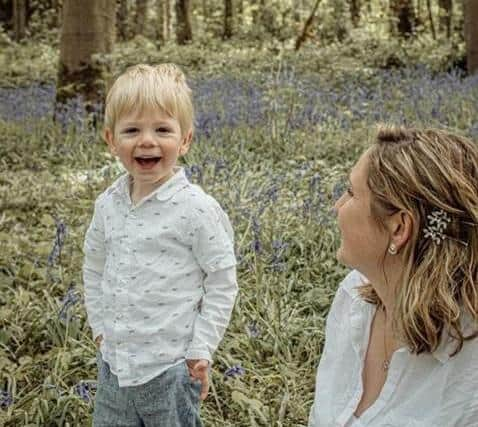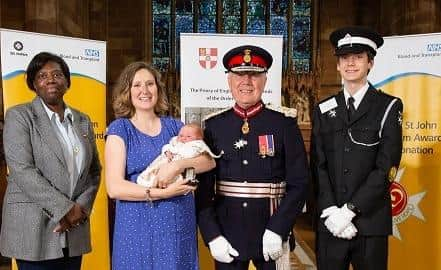Honour for little boy from Rugby who has helped save lives through organ donation
and live on Freeview channel 276
A little boy from Rugby who died from meningitis has helped save the lives of others through organ donation.
Barney Smith, two, has been honoured at a moving award ceremony in Birmingham.
Advertisement
Hide AdAdvertisement
Hide AdHis parents Ali and Sam received the Order of St John Award for Organ Donation, run in conjunction with NHS Blood and Transplant.


Ali said: “Agreeing to organ donation we feel has helped Barney’s name live on.
“Sadly, Barney became ill with meningitis quite suddenly last year. We had spent the weekend celebrating the sun with a wonderful barbecue with neighbours. Little did we know that the following week our lives would change forever.”
Barney parents thought the sun was to blame for their son refusing to nap.
Advertisement
Hide AdAdvertisement
Hide Ad“He began the week with a temperature and wasn’t really himself,” Ali said.


"By Friday we were in Birmingham Children’s Hospital and were told that Barney had pneumococcal meningitis. Barney had not displayed any of the usual symptoms of meningitis but our sunshine little boy had gone.
“Sam and I had already had a discussion about organ donation. We had seen a display in the hospital and I had brought it up, under the guise of a 'worst case scenario' as his death was still fiction for us. Sam's response 'of course, Barney loved to share, but it won't ever get to that' will always stick in my mind.
“So when we were given the news that nothing more could be done for Barney, the only thing we could think of, was what could he do for other people. The organ donation nurses team were called in, paper work gone through and Barney 'went live' (as we called it) into the system. Barney’s liver and both kidneys were matched, and at 7.22am one morning last spring sat in the prep room for surgery, Barney's heart stopped beating in my arms.”
But their lovely little boy went on to save others.
Advertisement
Hide AdAdvertisement
Hide AdAli said: “Barney’s liver went to save the life of a boy around Barney's age and his kidneys went to an older woman who had been on dialysis for over four years.
“Barney lives on in his gifts to them and for this we shall be forever grateful. If anything can make the sudden loss of your child, even a smidgen easier, for us it was knowing this.
“Child organ donation is something that is not spoken about enough, even when we spoke about it, it was still a fantasy, something to happen on TV, not to us, not to Barney. But it is a conversation that everyone should have, it made that decision for us so much easier, in what was the worst moment of our lives. After all, it might not be your child donating organs, but needing them.”
Mick Messinger, Chancellor of the Priory of England and the Islands of the Order of St John, said: "These events are always very emotional and I pay tribute to all the families that attend and, most of all, to their loved ones who have selflessly helped others to live after their own passing.”
Advertisement
Hide AdAdvertisement
Hide AdAnthony Clarkson, Director of Organ and Tissue Donation and Transplantation at NHS Blood and Transplant, said: “Organ donors and their families are truly inspirational people. Every donor transforms the lives of people they don’t know and the pride their families rightly feel is incredibly powerful.
“Patients who have received a transplant tell us that organ donors and their families are their heroes. The Order of St John awards, which we are proud to have been running with the Order of St John for ten years, are a chance for us all to recognise organ donors and their amazing contribution to society.
“We want to ensure as many people as possible have the opportunity to donate their organs and save lives. Please join the NHS Organ Donor Register at www.organdonation.nhs.uk.”
